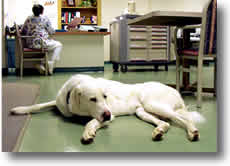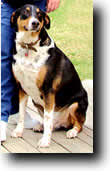 |
| Home | Topics | Index | Newest | Bookstore | Reprints | Privacy | About |
 |
| Home | Topics | Index | Newest | Bookstore | Reprints | Privacy | About |
The big creamy-white dog sprawled on the floor of the visiting area, half asleep. The doors opened; an attendant pushing a resident in a wheelchair entered, and the dog got to his feet, approached the chair, lowered his head a bit, and accepted a greeting and a neck rub from the elderly woman before she continued on her way. The dog went back to his latest project – dozing and waiting for the next opportunity to say hello and get a hug or a pat on the head.
The big creamy-white dog sprawled on the floor of the visiting area, half asleep. The doors opened; an attendant pushing a resident in a wheelchair entered, and the dog got to his feet, approached the chair, lowered his head a bit, and accepted a greeting and a neck rub from the elderly woman before she continued on her way. The dog went back to his latest project – dozing and waiting for the next opportunity to say hello and get a hug or a pat on the head.
 The big
dog is an Akbash, an ancient Turkish breed developed to guard sheep in the rugged
mountains of his homeland. His name is Link, and he is a trained facility dog
– a link to love for residents and staff at Llanfair Retirement Center,
a sprawling complex of buildings in College Hill near Cincinnati, Ohio. Llanfair
is part of The Eden Alternative®, a national program that trains
facility staff to integrate animals and plants into the daily life of their
residents and personnel. Link is one of Llanfair’s two dogs;
The big
dog is an Akbash, an ancient Turkish breed developed to guard sheep in the rugged
mountains of his homeland. His name is Link, and he is a trained facility dog
– a link to love for residents and staff at Llanfair Retirement Center,
a sprawling complex of buildings in College Hill near Cincinnati, Ohio. Llanfair
is part of The Eden Alternative®, a national program that trains
facility staff to integrate animals and plants into the daily life of their
residents and personnel. Link is one of Llanfair’s two dogs; 
Apollo, a black, tan, and white hound mix balances Link’s laissez faire style with an enthusiasm born of a plan to be petted by everyone in the world at least once. Apollo’s tail wags constantly as he seeks the next hand for petting and the next lap for resting his head.
In 1994, The Eden Alternative: Nature, Hope and Nursing Homes by William H. Thomas MD described a program to eliminate what he called the three plagues of long-term institutional care – loneliness, helplessness, and boredom. The Eden mission uses companion animals, indoor plants, and gardens to give patients the opportunity to care for other living things and to alleviate boredom through the variety of experiences brought to each facility by the animals.
The program must be embraced by staff and patients alike. Staff members attend Eden Alternative workshops to learn how to start an Eden program at their facility, decide what animals they want, and include the residents in the planning process. The facility designates neighborhoods that “own” the animals and are responsible for daily care and future planning involving the animals. Staff members walk the dogs and reinforce good manners daily.
Sherry Leet, resident care coordinator at Llanfair and leader of the Sunnyvale neighborhood where Link and Apollo hang out, is an advocate of the therapeutic value of the dogs and other animals. Like other staff members, Leet said she was skeptical at first, but came to the realization that the animals enhance the quality of life at the facility.
“I truly believe this is the most beneficial thing there is for our residents,” Leet said.
The animals live at the facility; Link and Apollo have their own room at Llanfair where they sleep at night and can rest during the day if they choose. Both dogs also romp in the enclosed courtyard where residents also relax and enjoy nice weather. Leet said that about 95 percent of the residents accept the animals, and that those who don’t want the dogs in their rooms can post a sign on the door that declares their space an “Animal Free Zone.”
Llanfair also has four cats from a local rescue, a large aquarium, and an aviary. This year, a grant from Procter & Gamble will allow the staff to begin work on an interactive garden for the residents.
The dogs chosen for each nursing home or retirement center must have low working drives and high tolerance for human contact. They come to the facilities through a service dog organization, not direct donation. Many of these dogs are rescued from shelters, and some are donated by breeders or rescue groups. Llanfair’s dogs came from Circle Tail, a service dog organization in Butlerville, Ohio, that works with state prison dog training programs that help inmates, dogs, and service dog organizations. Link was donated to Circle Tail by a breeder and received his basic training at Chillicothe Correctional Institution; Apollo was rescued from a dog collector in southern Ohio and trained at Marion Correctional Institution and Chillicothe.
“What we noticed was that Link was pleasant to everyone, did not bond tightly to one person, and had a low desire to work,” said Marlys Staley, Circle Tail director. “His main goals in life were to sleep, (get) a little light exercise, sleep, be petted and groomed, sleep. Since his energy level and desire to work were so low but his personality so sweet, we thought he would make a great facility dog.”
Circle Tail reported on the Llanfair dogs on its website. About Link, the website said: “The residents feed, groom and pet him while staff members walk him several times a day. He greets visitors as they come in the entrance. Although he has his own room with a bed, Link prefers lounging around the lobby or in the halls near the residents’ rooms. He also loves to spend time in the courtyard where he lays in the sun watching the birds. The residents love him, even when he occasionally steals stuffed animals off their beds.”
Although Apollo was more outgoing, Staley said, he also had low work drive and a moderate energy level at best. “Apollo really just wanted to lean against you and be petted, and he really didn’t care who you were if you were nice,” she said. “Llanfair was looking for another dog at the time and we thought he would be a nice addition to Link as he was more sociable.”
About Apollo, the website said: “Although he shares a room with Link, Apollo prefers lounging around the lobby or in the halls near the residents’ rooms. He greets visitors as they come in the entrance. He is always scrounging for free hands to pet him. With his soulful brown eyes and paw in the lap, most cannot resist. When his is not ‘working’ he enjoys playing with Link and taking long walks.”
Facility dogs are generally medium-sized, good with other dogs and with cats, don’t bond easily to one person, have low protective instincts, are somewhat submissive, have medium to low energy, and enjoy human contact, Staley said.
“The prisons are actually a very good assessment of whether a dog would be a good facility dog,” she said. “They are continuously around people, strangers are always coming into their area, there are other dogs around and even stray cats, they get obedience and housetrained and are taken around to be petted by all sorts of people. We also have different handlers work with them to get them used to taking commands from multiple people.”
Many service dog organizations donate the dogs to facilities, but it obviously costs money to feed the animals and provide veterinary care and grooming and replace worn bedding and equipment. Llanfair appreciates money donations towards the costs of care for Link and Apollo and volunteer assistance to walk and groom the dogs. Donations can be sent to Kathy Westmoreland, Llanfair’s chaplain and the Eden Alternative fundraising coordinator, Llanfair Retirement Community, 1701 Llanfair Avenue, Cincinnati, OH 45224.
Non-profit CircleTail depends on donations to feed and care for its dogs. See the accompanying item about Circle Tail for details.
Circle Tail is a nonprofit organization that operates an animal sanctuary and a service dog training school on 14 acres of private property in southern Warren County, Ohio. The sanctuary shelters animals that have lost their homes until a new family can be found. The training school prepares dogs to assist handicapped owners and to live in residential care facilities.
The service dog candidates are donated by breeders or pet owners or are rescued from shelters. Puppies spend a year or so in foster homes or one of five Ohio prisons to get basic obedience training and socialization before they receive service dog training. Service dogs are provided to individuals who are physically, mentally, or emotionally handicapped at no cost, so Circle Tail depends heavily on donations of money, supplies, equipment, and volunteer time.
The Circle Tail wish list includes dog crates, houses, and kennel runs; dog toys for retrieving and chewing, leashes and collars, grooming equipment and supplies; brooms and mops; storage bins; trash cans with lids; and other dog care items and supplies.
Volunteers are needed to help socialize and train the dogs, clean the kennels, edit the newsletter, make follow-up calls on adoptions, help with fund-raising, and writing grants. Ann Grimes, (513) 779-2464, is the volunteer coordinator.
Dollar gifts should go to:
To donate items on the wish list, call (513) 877-3325.
Founded in 1997, Circle Tail placed six service dogs with disabled owners and two service dogs in residential care facilities in 2000 and found new homes for dozens of dogs and cats. Volunteers spent more than 4000 hours helping the organization achieve its goal.
Their website is at http://www.circletail.org/
This page is a part of the Dog Owner's Guide internet website and is copyright 2021 by Canis Major Publications. You may print or download this material for non-commercial personal or school educational use. All other rights reserved. If you, your organization or business would like to reprint our articles in a newsletter or distribute them free of charge as an educational handout please see our reprint policy.
We will be modifying the Dog Owner's Guide site with new and updated articles in 2021 as well as new booklists so check back often to see what's new!
| Home | Topics | Index | Newest | Bookstore | Reprints | Privacy | About |